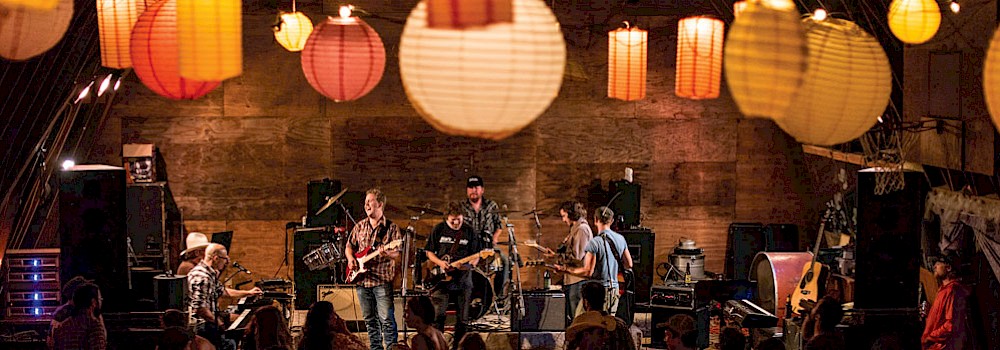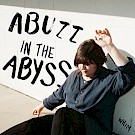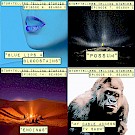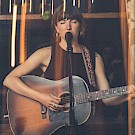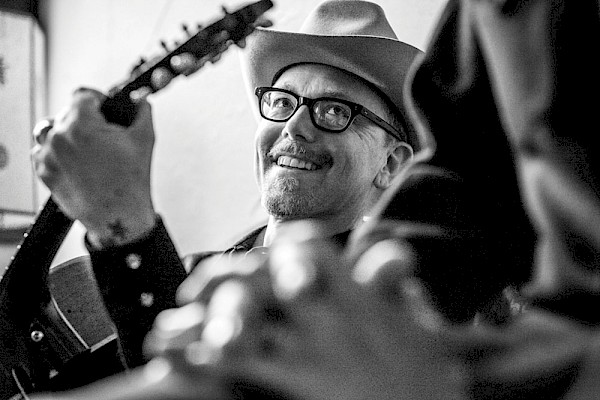 Pete Krebs (photo by Robert Delahanty); Lead photo: The annual Hoot Family Campout at Trout Lake, Wash. (photo by Chad Lanning)Before he reached notoriety and acclaim as a young man with his ’90s alternative rock band Hazel, Portland-based guitarist and singer Pete Krebs had already tapped into a musical language and tradition that has served him well ever since.
Pete Krebs (photo by Robert Delahanty); Lead photo: The annual Hoot Family Campout at Trout Lake, Wash. (photo by Chad Lanning)Before he reached notoriety and acclaim as a young man with his ’90s alternative rock band Hazel, Portland-based guitarist and singer Pete Krebs had already tapped into a musical language and tradition that has served him well ever since.
Portland’s rich legacy of roots music—sometimes given the ubiquitous label Americana—features a heady mix of country, folk, bluegrass and swing around which an ever-growing community has thrived.
At first, Krebs joined that community as a satellite, orbiting a scene that had been established in the early 1970s by artists such as Michael Hurley, The Holy Modal Rounders and Jeffrey Frederick & The Clamtones. What he discovered was a direct line from the East Coast American folk revival of the early ’60s and a collection of musicians willing to impart their knowledge and wisdom about the music they played.
“It was sort of the way roots music is supposed to work,” Krebs says. “It’s an apprenticeship. You find a musician who’s older than you and you learn the ropes from them. I learned not just the music and a variety of styles, but I also learned how to be a working musician from them.”
After Hazel disbanded around 1997, Krebs went on to form Golden Delicious, a country band with a bit of a punk rock edge. He’d later play in old-time and gypsy jazz groups, and currently performs with Pete Krebs and His Portland Playboys, an act based on his love of music by Western swing legend Bob Wills.
He says finding his way into that welcoming roots community in Portland—and being open to the various music styles within—confirmed his feelings of wanting to continue on that path.
The Hoot, as in Hootenanny
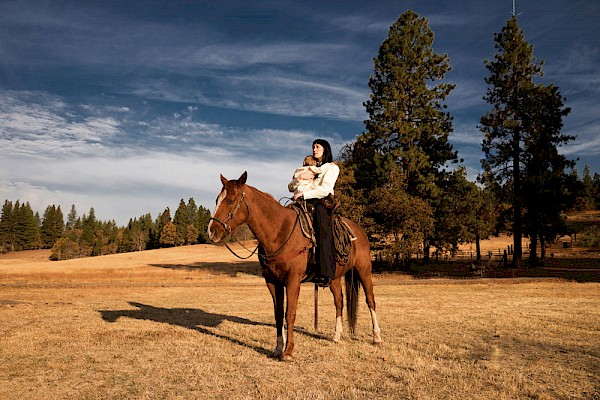 Carra Barratt Stasney: Photo by Chad LanningCarra Barratt Stasney had been in Portland for five years pursuing a career as a junior high teacher when she finally scratched an itch to get out and play music again.
Carra Barratt Stasney: Photo by Chad LanningCarra Barratt Stasney had been in Portland for five years pursuing a career as a junior high teacher when she finally scratched an itch to get out and play music again.
Raised on ’70s rock radio with a love of Fleetwood Mac, Linda Ronstadt and Emmylou Harris, Stasney came to town with a full-length alt-country record already to her credit. But she didn’t know how to network to find the right people to play with or the right audience to play for.
She reached out to Lewi Longmire, the well-connected guitarist and booker for the LaurelThirst Public House, asking where she might find some players to jam. (Read all about the unique community you'll find at the NE Portland pub, which has been going strong for 30 years.) Longmire suggested she visit The Hoot, a monthly jam of like-minded roots musicians that took place in a small barn in outer SE Portland.
“I thought it was going to be some dudes in a garage and I’m thinking, ‘Not for me,’” she jokes.
But Stasney took a chance and found something very different than she expected.
“It was really cozy, with the decorations and the atmosphere,” she tells. “It felt like this really cool roadhouse venue. But I knew it was going to be cool because the people were nice and friendly and enthusiastic.”
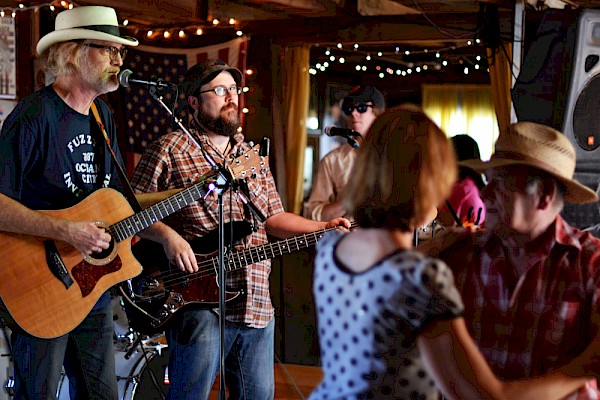 At The Hoot: Mike Coykendall, Chad Lanning and John Shepski of Fluff & Gravy Records, and Chuck Noland (far right), the deceased founder and original host of the HootNot only had Stasney found an instant audience for her music, but she also connected with countless musicians who all seemed willing to step up and support her ideas for taking the music forward.
At The Hoot: Mike Coykendall, Chad Lanning and John Shepski of Fluff & Gravy Records, and Chuck Noland (far right), the deceased founder and original host of the HootNot only had Stasney found an instant audience for her music, but she also connected with countless musicians who all seemed willing to step up and support her ideas for taking the music forward.
“Suddenly, it was like, ‘Whoa! This is a shitload of resources,’” she says. “It felt like hitting the jackpot. And it was also a really fun place to try some things musically that you might not be quite comfortable with yet and nobody’s going to judge you.”
“I thought she could sing really well, but I also liked her vibe,” says Mike Winter, one of the founders of The Hoot who is connected to the local country scene as a drummer and singer. “She wasn’t stuck on herself and she seemed all about the music. That’s kind of typical of The Hoot. There are no stars. It’s all about the songs and the music.”
Stasney went on to form Copper & Coal—a much-acclaimed traditional country duo with fellow singer Leslie Beia—writing and performing original songs surrounded by some of the best country players in town.
She later recorded a solo album as Mamma Coal, experimenting with the idea of an original song-story based loosely on the Willie Nelson classic Red Headed Stranger called Raven Haired Vixen.
“When you have people telling you that you’re good, you get excited,” Stasney says. “The support and encouragement is a huge motivating factor. I found that at The Hoot.”
Growing Roots at Home
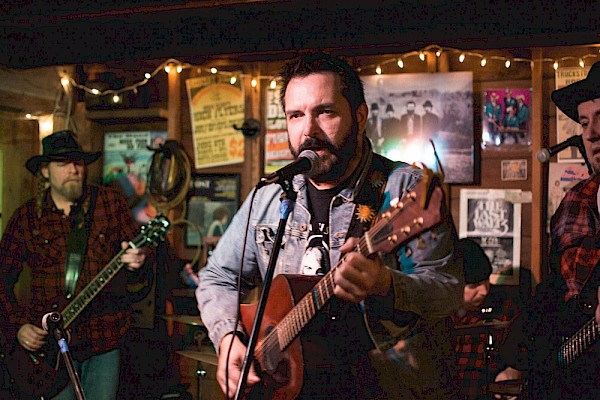 Morgan Geer of Drunken Prayer at The Hoot: Photo by Chad LanningPrivate parties such as The Hoot are slightly grander versions of a concept that has continually breathed life into the local roots community: the house show. In living rooms, basements and backyards across the Portland area, boutique-level shows have provided audiences for touring artists and up-and-comers alike.
Morgan Geer of Drunken Prayer at The Hoot: Photo by Chad LanningPrivate parties such as The Hoot are slightly grander versions of a concept that has continually breathed life into the local roots community: the house show. In living rooms, basements and backyards across the Portland area, boutique-level shows have provided audiences for touring artists and up-and-comers alike.
In NE Portland, the founders of Fluff & Gravy Records have built a full-service subscene all under one roof. The family home of label co-founders John Shepski and Jennifer Petrolati features a recording studio in the basement (where artists such as Jeffrey Martin, Anna Tivel and The Harmed Brothers have recorded), a living room that has hosted dozens of intimate shows, and a backyard famous for fire pit parties where all are welcome to share songs.
At The Deer Lodge in SE Portland, musician and producer Ezra Meredith has turned his home into a thriving haven for like-minded players and their friends.
A detached garage serves as a clubhouse and bar with craft beer on tap. It’s become a place for friends to gather to spin records and watch Blazers games. The home’s basement is where multiple records have been made by artists such as Countryside Ride, Drunken Prayer and Hearts of Oak. Outside, the backyard features a covered stage and plays host to evening concerts during warmer months.
Morgan Geer, the leader of Drunken Prayer, has a deep connection with both The Deer Lodge and Fluff & Gravy. Comfortably finding his place in the Portland roots scene when he moved here in the mid-2000s, he’s recorded at both places and put out records through each label.
“Unlike places like New Orleans or Memphis or Nashville, that have real strong musical identities, Portland seemed like more of a blank slate,” says Geer, who grew up in the South. “I loved that. It was the most welcoming and open with the deepest talent pool I’d found.”
A Landmark on a Musical Journey
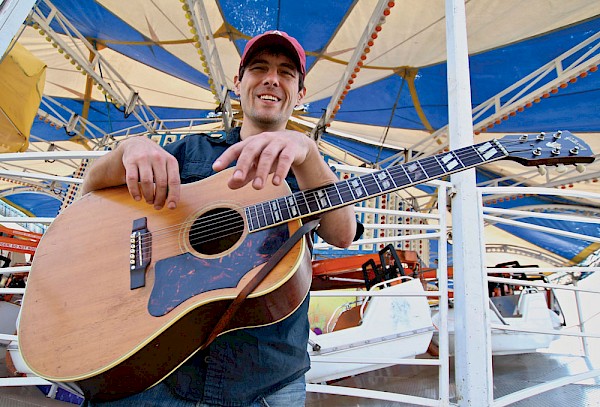 Jonathan Trawick: Photo by Grant WheelerWhen he moved here from his native Arkansas a few years back, old-time country guitarist, singer and mandolin ace Jonathan Trawick saw Portland as a place to connect with a larger network of players and venues.
Jonathan Trawick: Photo by Grant WheelerWhen he moved here from his native Arkansas a few years back, old-time country guitarist, singer and mandolin ace Jonathan Trawick saw Portland as a place to connect with a larger network of players and venues.
“I was just looking for a bigger pond musically,” he says. “I considered Nashville but I just decided I wanted to get further away from home. And Portland’s a pretty good launching pad for touring the West Coast.”
When he arrived, he found a slightly segregated scene where the old-time players rarely mixed with the bluegrass pickers. But all that seemed to fade away when he played his first gig at the Landmark Saloon, a tiny honky-tonk bar on SE Division Street.
There, he found an audience for his country swing band, Well Swung, and also for his bluegrass band, JT & Rowdy Mountain. He also picked up some part-time work mixing live sound at the bar.
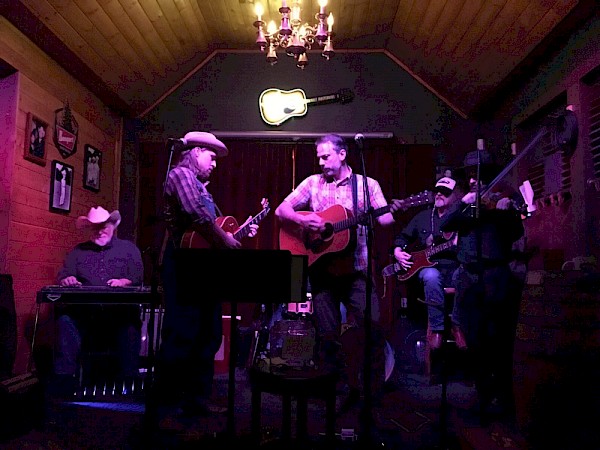 The High Cotton Boys at the Landmark Saloon“Landmark is a great little gem of a spot,” Trawick says. “Like anything, it’s not perfect but they do a great job. They’ve totally created a scene and I’ve been honored to get to be a part of that. I’m grateful they’ve given me a platform to help me build my projects.”
The High Cotton Boys at the Landmark Saloon“Landmark is a great little gem of a spot,” Trawick says. “Like anything, it’s not perfect but they do a great job. They’ve totally created a scene and I’ve been honored to get to be a part of that. I’m grateful they’ve given me a platform to help me build my projects.”
In its seven-plus years of existence, the Landmark has provided steady work for a number of musicians who have fit nicely into a scene where swing dancers and two-steppers frequently crowd the small dance floor.
It’s also been a place for Trawick to enhance his profile as he leans on other clubs and venues for steady work.
“There’s been enough local gigs for me to get by, and it’s done nothing but grow,” he says. “It’s been hard work. A job should be hard work.”
Note: As of January 26, the Landmark has canceled all live music until further notice. Posting on Facebook the day prior, the bar said: "We have had to cancel this weekend's shows due to a zoning and capacity issue. We are working on this as fast as possible, to hopefully continue with live music in the future. Sorry for the inconvenience, it hurts us as well. Will keep everyone posted."
The Brotherhood of Steel
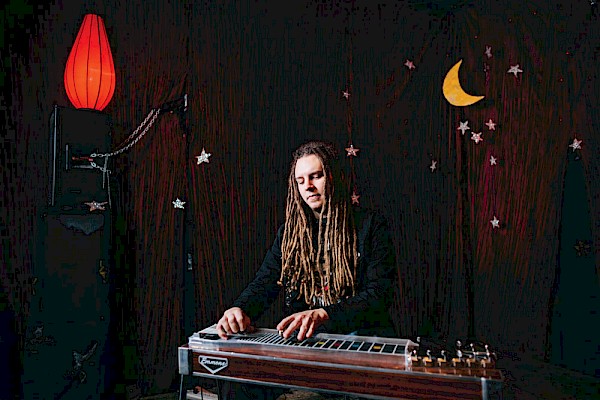 Bryan Daste at the LaurelThirst: Photo by Jason QuigleyWith his flowing dreadlocks, Bryan Daste doesn’t look like your typical pedal steel guitar player. You won’t see him wearing a cowboy or trucker hat, though none of that seemed to matter when he moved to Portland in 2005.
Bryan Daste at the LaurelThirst: Photo by Jason QuigleyWith his flowing dreadlocks, Bryan Daste doesn’t look like your typical pedal steel guitar player. You won’t see him wearing a cowboy or trucker hat, though none of that seemed to matter when he moved to Portland in 2005.
“When I first got here, I met a few of the local steel players and it was immediately like, ‘Welcome to the club. Welcome to the brotherhood,’” Daste says.
As arguably the signature sound of country music, steel guitar is steeped in a tradition that players seem almost obligated to keep alive. Locally, the pedal steel guitar community hosts bi-annual “steel jams” where as many as 30 or more players come together to demonstrate techniques and show off their latest, greatest gear.
“It’s a bit of an older crowd, so whenever a new, younger player shows up, everybody wants them to feel welcome and encourage them,” Daste says. “I’ve had several players say, ‘Hey, why don’t you come over and let me show you a couple of things?’ Like a really informal lesson. No money changes hands. It’s more like, ‘Let’s just sit around and play and talk about steel.’”
Daste was hesitant to attend his first steel jam because he’d only been playing the instrument for a short time.
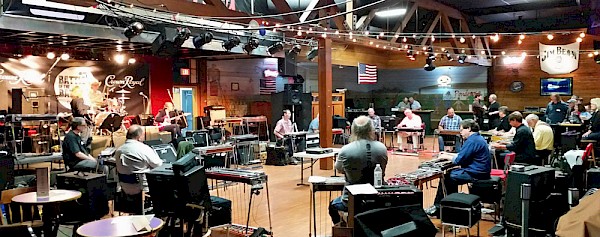 A steel jam at the Ponderosa Lounge“I just went in with the attitude that I was going to be the worst player in the room, so there was no pressure,” he says. “That attitude has served me well because if you’re trying to impress, you soon realize there are so many good steel players, you’re not going to impress anybody.”
A steel jam at the Ponderosa Lounge“I just went in with the attitude that I was going to be the worst player in the room, so there was no pressure,” he says. “That attitude has served me well because if you’re trying to impress, you soon realize there are so many good steel players, you’re not going to impress anybody.”
Thanks to his connections in the steel community, Daste has been able to generate business for the recording studio he co-owns, The Magic Closet in Sellwood, and also find steady work as a sideman. He plays with singer-songwriter Brian Rozendal in the two-man folk band Small Souls, tours as sidekick and musical director for Alaska-based singer Emma Hill, and occasionally sits in and tours with alt-country rocker Matt Hopper.
And though he may appear atypical for a steel guitar player, he’s fit nicely into the local scene.
“I think that’s a really cool part of being in Portland. People really let their freak flag fly here,” he says. “I’m definitely one of the more normal looking people on any given block.”

